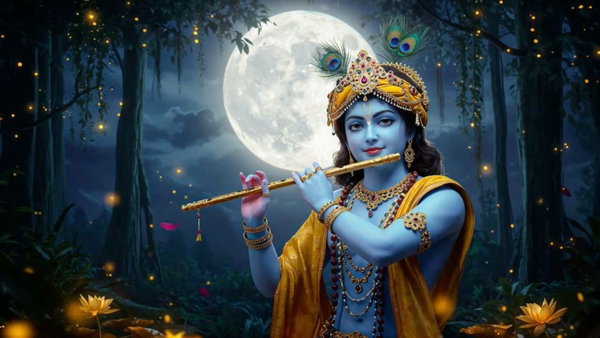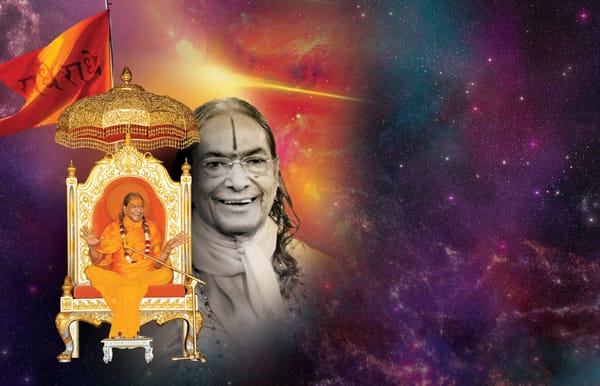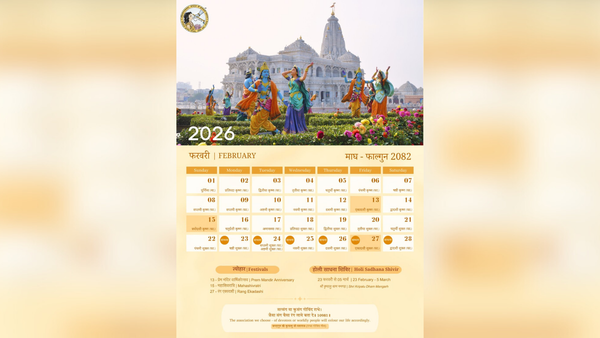Daily Devotion - Oct 29, 2025 (English)- What Is True Love?

There is a Hindi word composed of two and a half letters - Prem, meaning Love.
paḍhi-paḍhi ke jaga muā, paṇḍita bhavā na koya
ḍhāī ākhara prema ke, paḍhe so paṇḍita hoya (Kabirdas)
"True wisdom does not come from endless study. The one who realizes the essence of Love is a true scholar."
Love is supreme.
The definition of happiness is - yo vai bhūmā tatsukhaṃ -
- That which is infinite in measure and
- That which lasts for eternity.
Worldly happiness possesses neither of these two qualities. Whether it is the happiness derived from material objects or from living beings (mother, father, son, wife, husband) - all forms of happiness are limited and come to an end in a short time.
When a mother embraces her son, she feels happiness - but it is not infinite in measure. The second time she embraces him, the happiness decreases. The third time it decreases further, and by the tenth time, the happiness ceases altogether. The very face of the wife that once filled a man with delight, making him long to behold her secretly, later becomes the same face he finds comfort in avoiding.
The same condition applies to every sense object. This is also true for all worldly possessions. Thus, all worldly pleasures are -
i) Finite
ii) Transient
iii) Impermanent and
iv) Last for only some time.
After that, not only do they end, but the very same things become sources of sorrow.
The celestial gods experience happiness millions of times greater than the happiness of Mrityulok. Yet, even the happiness of heaven is limited and temporary, just like the happiness of this world. Infinitely superior to that is the happiness of liberation (Moksh), which is boundless and eternal. That is true happiness. A person who has attained liberation cannot desire worldly happiness - in fact, he cannot even think of it.
However, the bliss of divine love - Premānanda, the joy of loving Shri Krishna - equals millions of Mokshas.
Everyone knows what love is. God has filled every living being with love. Animals, birds, insects, humans, demons, and celestial Gods - all know how to love. If someone holds a puppy, the mother dog rushes to protect it. Why does anyone cry for another - whether for a mother, father, or anyone else? It is because love for that person resides within. One weeps when that love remains unfulfilled.
This same love is also present in saints. But they weep for God, whereas we weep for the world. The saints have no additional senses beyond ours. Whatever you have, they also possess the same. They are our own brothers; they were once like us. Through devotion, they became saints. They have no extra powers. Just as we yearn for the things we love, thinking, "When will I attain it?", similarly, a devotee yearns for God. The only difference lies in the object of desire.
Our mind can be directed toward four kinds of areas -
i) By giving it to a tamasic person, you receive a tamasic result, meaning you will be born as a demon after death.
ii) By loving a rajasic person, you will be born as a human after death.
iii) By loving a sattvic person, you will be born in the heavenly realm.
The mind's love remains the same. Just as a tamasic person loves violence or alcohol, a sattvic person loves non-violence. There is no difference in the act of loving, only the result is different -
kriyā sarvāpi sarvatra paraṃ kāmo na vidyate (Vallabhacharya)
"The actions are the same everywhere - but the difference lies in the object of love."
The love that the Gopis had for Shri Krishna - externally, their actions appeared the same as those between a lustful worldly man and woman. But there was no lust in the Gopis - no selfishness. That is the only difference. We do everything in this world for self-interest, whereas the happiness of the Gopis was Shri Krishna Himself.
So everyone knows how to love, everyone does love - only the area differs. If one loves in the right area, one receives the correct result; if one loves in the wrong area, one receives the wrong result.
The conclusion is that - There are two kinds of love -
- False Love -
That love whose result is misery, unrest, and dissatisfaction; that which destroys body, mind, and soul, and keeps the being wandering through 8.4 million life forms. This includes those who love out of physical selfishness - identifying themselves with the body and remaining engaged in satisfying their senses, decorating and beautifying their body so that others may be attached to them and praise them. Whoever nurtures this disease loves only for the pleasure of the senses. - True Love -
That love which is directed toward God and the Guru, who are pure.
By loving them -
i) one attains divine bliss (Divyānand), and
ii) is liberated from the bondage of the world (Bhavabandhan)
Even if you selflessly love someone within the realm of Maya, you will not attain Vaikuntha - you will only return to this same world. And even if you love God with some desire, you will still attain God.
So the formula is this - i) Celestial Gods, ii) Humans, iii) Demons - all love only for their own self-interest. If they give something to anyone, they do so expecting something in return. Even the act of giving is done only to receive - even if it is for a small profit. Even when giving charity, a subtle desire remains - that after death, in the next life, one may regain wealth.
O Kishori Ju, O Shyamsundar!
You alone love without any self-interest. Only You give without expecting anything in return. As long as one's personal self-interest remains - meaning one has not yet experienced divine bliss - one remains selfish until attaining God and receiving divine bliss.
Until that happens, even if someone appears to be working for others, in reality, they do so only for their own happiness. Everyone loves one another only for their own self-interest - for their own happiness -
na vā are sarvasya kāmāya sarvaṃ priyaṃ bhavati
"Nothing is dear for the sake of that thing; everything is dear for the sake of the self."
But when one's selfishness has been resolved - when one has attained God and the veil of Maya is destroyed - why does such a person act? He has nothing left to do. Yet, he acts. Dhruva and Prahlada ruled for millions of years; saints married, begot children, fought wars, and engaged in conflicts. Yet God says, "They did nothing; I did it."
In other words, God Himself performs the actions of the saints.
Whatever God and the realized saints do, they do solely for the welfare of others, for they have nothing left to do for themselves. Even while performing actions involving lust, anger, greed, and attachment, they remain forever blissful. Even after committing millions of murders, they see Shri Krishna everywhere. And we? If even a trace of hatred arises toward someone, we burn within. Such is the vast difference.
Therefore, in the kirtan, the devotee says -
Oh Shri Radha Krishna, 'manuja danuja devahu Rādhey' - meaning celestial gods, humans, and demons - all love out of self-interest.
Only You (God) and Your devotees love without any self-interest.
Recommended books by Jagadguru Shri Kripalu Ji Maharaj related to this topic:





